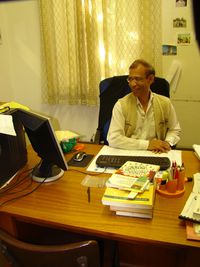Dr. Aminur Rahim: Difference between revisions
mNo edit summary |
mNo edit summary |
||
| Line 16: | Line 16: | ||
Other Publications: | Other Publications: | ||
"Territorial politics and national development in Pakistan (1947-1969)" Asian Profile, 10:3, June, 1982. | "Territorial politics and national development in Pakistan (1947-1969)." Asian Profile, 10:3, June, 1982. | ||
[http://www.asianresearchservice.com/v10.htm] | [http://www.asianresearchservice.com/v10.htm] | ||
[http://www.econbiz.de/Search/Results?lookfor=creator%3A%22Rahim%2C+Aminur%22&type=AllFields&limit=50] | [http://www.econbiz.de/Search/Results?lookfor=creator%3A%22Rahim%2C+Aminur%22&type=AllFields&limit=50] | ||
"Multiculturalism or Ethnic Hegemony: A Critique of Multicultural Education in Toronto." Journal of Ethnic Studies, v18 n3 p29-46 Fall 1990 | |||
[http://eric.ed.gov/?id=EJ419417] | |||
"After the Last Journey: Some Reflections on Bangladeshi Community Life in Ontario." Polyphony Vol.12, 1990 pp. 8-11 | "After the Last Journey: Some Reflections on Bangladeshi Community Life in Ontario." Polyphony Vol.12, 1990 pp. 8-11 | ||
Revision as of 23:49, 14 December 2013
Alice Eastern Cape South Africa The following coordinate was not recognized: Geocoding failed.The following coordinate was not recognized: Geocoding failed. Person
Dr. Aminur Rahim is an Asian Canadian Professor in Development Studies at the University of Fort Hare, Eastern Cape, South Africa. He has taught at the University of Zimbabwe, Harare, York University Toronto and the Gaffargaon College in Bangladesh. He is the author of the 1997 book, Politics and National Formations in Bangladesh. [1] [2]
Rahim has published articles on education and the formation of class, the sociology of education, identity politics, and multiculturalism and ethnicity. His forthcoming book entitled “Rights to Food in Africa: Learning from Asian experiences” will be published in 2014 by Xlibris, a Penguin Random House Company.
Professor Rahim holds a BA Hon, MA (University of Waterloo), and PhD (University of Toronto.
His research interests include Decolonisation and Human Development, Nation and Political Formations, Theories of Development, State, Education and Development, Research Methodology, Race and Ethnicity in Canada and the United States, South Asia, East Asia.
Other Publications:
"Territorial politics and national development in Pakistan (1947-1969)." Asian Profile, 10:3, June, 1982. [3] [4]
"Multiculturalism or Ethnic Hegemony: A Critique of Multicultural Education in Toronto." Journal of Ethnic Studies, v18 n3 p29-46 Fall 1990 [5]
"After the Last Journey: Some Reflections on Bangladeshi Community Life in Ontario." Polyphony Vol.12, 1990 pp. 8-11 © 1991 Multicultural History Society of Ontario. [6]
Public Lectures:
"Globalization and Food Security with a Human Face," November 17, 2009. Visiting Fulbright Scholar, Global Legal Studies, University of Wisconsin-Madison, Noon-1:15pm, Lubar Commons (7200 Law). [7]
"Roots of Islam in Pakistan," January 18, 2012. [8]
On January 20, 2014, he presented a lecture entitled: The Bangladeshi and the Chinese Diaspora in Canada: A Comparative Perspective at the East Asian Library, University of Toronto.
Summary:
Globalization, caused by imperialism, trade or labor migration, has originated the influx of settlers from the South to the North. Such influx is, both involuntary and voluntary, a response to political, social and economic insecurities in the homeland. The Canadian government has developed a flexible immigration policy that is in tune with meeting the increasing labor demands in local conditions, encouraged by the various immigrants in the building of Diaspora communities. Unlike the immigrant community, the Diaspora is a discrete community in space with a strong sense of cohesion. The purpose of this talk is to explore how Bangladeshis and Chinese immigrants have managed to maintain their transnational, hyphenated and diasporic identities against the constant motion of interpretation and re-interpretation through the struggle for community space and community representation. From this perspective, migratory souls have multiple identities and multiple homes –borderless beings. Living away from home does not mean longing for the ancestral lands has diminished; rather, diasporic cultural development often compensates through social coherence. By looking at various socio-cultural mechanisms of identity formation, this presentation argues that immigrants’ identity is not fixed; rather, it is always in a state of flux. To explicate this hypothesis, a comparison of the Bangladeshi and the Chinese communities will be made to demonstrate whether there is a common strand (trend) between the experience of two communities or not.
